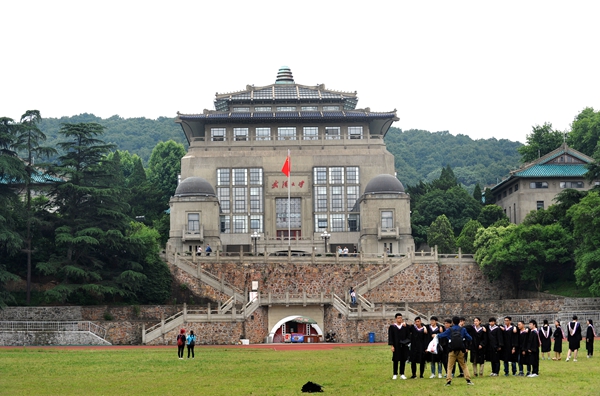Leading in the legal field


Top law school taps into its tradition to face the challenges and opportunities ahead, Alexis Hooi and Yan Dongjie report in Wuhan, Hubei.
As a child, Zou Zhihan's idea of the law was related to legal aid. "I sometimes saw legal aid volunteers advising and helping the people who had hearing disabilities in my community. It could have been the beginning of my relationship with our legal system-constantly improving, with occasional ups and downs, pressing firmly forward."
Zou, now a law student at Wuhan University in the capital of Central China's Hubei province, still believes that the future of Chinese law is to "better serve the community and the country".
She is part of the next generation of law professionals well-placed to tap the heritage and resources of one of the country's top law schools, which marked the 111th anniversary of the establishment of its law education and the 40th year of the resumption of the classes on its grounds late last month.
During the celebrations, luminaries from the legal sector at home and abroad-law academics, officials, professionals, alumni and guests-together looked back on the school's stellar achievements over the past four decades as it prepared students and stakeholders for the opportunities ahead.
The university is one of the top-ranked colleges in China, with its law graduates filling leading positions in the domestic and international fields. Representatives from more than 50 major institutions and organs, including the elite Peking and Tsinghua universities and Renmin University of China, as well as the Supreme People's Court and Supreme People's Procuratorate, also attended the event.
In his welcome speech for the anniversary, Wuhan University President Dou Xiankang said: "Legal education has always been a core field of our university and it plays a key role in the modern rule of law in the country amid globalization, with teachers and students carrying forward a spirit of self-improvement and innovation to help open new chapters in the sector."
The university's law school traces its roots to 1908, becoming an important part of tertiary education in the seminal years of education that followed. It restarted its law classes in 1979, along with the resumption of the national college entrance exams.
The school has since topped educational rankings, placing second in the latest local listings and the top 100 globally. It boasts nearly 20,000 graduates spanning the past four decades, with more than 2,000 current students, including over 1,000 master's, 400 doctoral and 100 international candidates.
At the anniversary event, Zhang Wenxian, member of the Party committee of the China Law Society and director of the academic committee, pointed to the role of the university's law school in the upgrading, innovation and integration of traditional and emerging fields and disciplines toward the country's development in the new era.




































